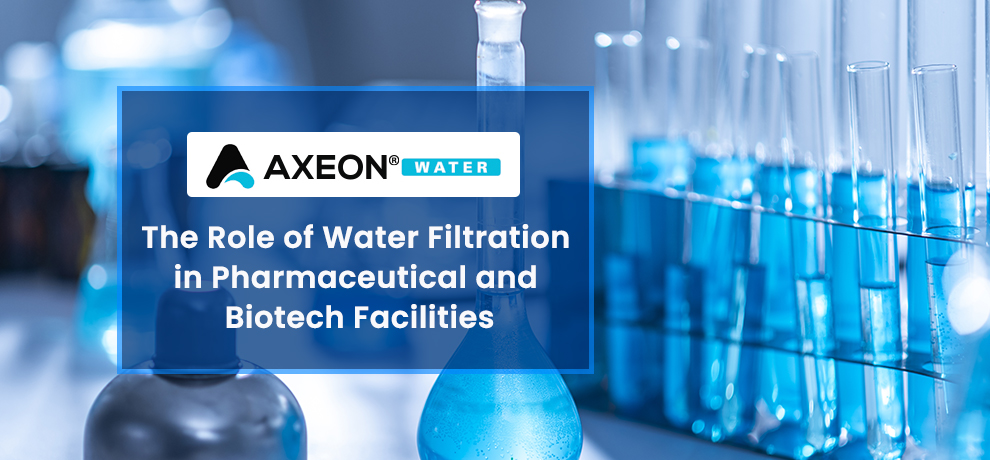Technical Articles

The Role of Water Filtration in Pharmaceutical and Biotech Facilities
The role of water filtration in pharmaceutical and biotech facilities is to control contaminants, support product purity, and maintain regulatory compliance across all drug manufacturing, laboratory, and bioprocessing operations. Filtration protects process integrity, product safety, and facility reputation.
Why Water Filtration is Critical in Pharma and Biotech
Water filtration is critical in pharmaceutical and biotech facilities because even a single contaminant can cause batch rejection or regulatory action. Over 90% of drug manufacturing and laboratory processes in the U.S. require water purity greater than standard drinking water, as defined by USP and cGMP regulations. Maintaining this high level of water quality directly impacts patient safety, product integrity, and operational efficiency.
What Standards Govern Water Filtration in Pharmaceutical and Biotech Facilities?
Water filtration for pharmaceutical and biotech facilities must meet strict quality standards set by U.S. Pharmacopeia (USP), FDA cGMP, and EPA regulations. USP and outline requirements for microbial, chemical, organic, and endotoxin content in process water, Water for Injection (WFI), and laboratory systems. High-purity water systems are validated to remove 99.9% or more of microorganisms and pyrogens, using audits and periodic testing to ensure ongoing compliance with these standards.
Where Does Water Filtration Impact Facility Operations?
Water filtration impacts five main areas of facility operations: drug manufacturing (ingredient dissolution, granulation, buffer preparation), bioprocessing (media preparation, chromatography, tangential flow filtration), laboratory research (analytical validations, sample dilutions), equipment cleaning (CIP/SIP—65% of sites cite water quality as the top cleaning variable), and final product purification (removal of endotoxins and ensuring sterility in end formulations).
What Contaminants Must Be Removed From Water in Pharma and Biotech?
Pharmaceutical and biotech water must be stripped of multiple contaminant types, each presenting unique risks to drug formulations and bioprocesses. Critical contaminants include particulates such as sediment, rust, and silt; organic molecules like total organic carbon (TOC), pesticides, and trace pharmaceuticals; metals and ions including lead, arsenic, and iron; disinfectants such as chlorine and chloramine; microbial load (bacteria, pyrogens, viruses); and endotoxins. Standard removal goals are particulate reduction down to 0.2–5 microns and greater than 99.9% reduction in biological and organic load—benchmarked through studies on process water, WFI, and laboratory streams.
Which Water Filtration Technologies Are Used in Pharmaceutical and Biotech Applications?
Multiple advanced water filtration technologies are implemented in pharmaceutical and biotech facilities to achieve validated purity, remove specific contaminants, and maintain strict process control. These technologies operate as part of an integrated approach that targets chemical, organic, particulate, and microbial risks across the water lifecycle.
Media Filtration Systems
- AC-Series Activated Carbon uses granulated coconut shell carbon to reduce chlorine, heavy metals, and organics. It prevents membrane fouling and extends equipment lifespan, processing flows from 1 to 100 GPM.
- CC-Series Catalytic Carbon utilizes catalytic granules for effective chloramine and secondary disinfectant reduction. Systems are programmable and minimize water waste through optimized regeneration cycles.
- ZE-Series Zeolite filters sediment, rust, and particulates down to 5 microns at up to 105 GPM. Automatic backwashing maintains high throughput and limits operator intervention.
- KX-Series Iron Removal applies Katalox media for efficient iron elimination and mitigation of rust staining; compatible with municipal and well water.
- Upflow Granulated Carbon and Calcite systems provide pH correction and additional chlorine reduction. Calcite balances acidity, while upflow carbon effectively neutralizes tastes, odors, and remaining chemicals.
Cartridge Filtration Systems
- E3-Series and FST-Series are modular systems using refillable cartridges. Cartridges are engineered for diverse tasks, with media options including calcite, mixed-bed deionization, catalytic carbon, and sediment filtration (down to 0.2 microns), supporting flows up to 59 GPM.
- FSD-Series offers one-stage, two-stage, or three-stage filtration for customizable pre- and post-treatment. Compatible with a full range of standard 4.5" diameter cartridges for sediment, chlorine, lead, organics, and more.
Advanced Water Purity Solutions
- Reverse Osmosis (RO) is essential for rejecting dissolved ions, organics, and bacteria---achieving 98--99% TDS and bacteria rejection. AXEON's RO systems combine high-rejection membranes with robust monitoring and support energy efficiency.
- Ultrapure Water Systems combine RO, deionization, and ultraviolet sterilization to achieve resistivity below 0.25 µS/cm, and endotoxin levels <0.25 EU/mL---requirements for critical bioprocessing, laboratory, and injectable product applications.
| Stage of Use | Typical Filtration Technology | Primary Target Contaminant | Example Standard |
|---|---|---|---|
| Raw/prefiltration | ZE-Series, AC/CC-Series | Sediment, chlorine, chloramine | EPA, USP <1231> |
| Conditioning/pH adjustment | Upflow Calcite, FSD/E3/FST | Acidity, chlorine, heavy metals | cGMP, USP <645> |
| Process/purified production | RO, Cartridge (FST, E3) | Bacteria, endotoxins, metals | USP WFI, FDA, EMA |
| Cleaning/sterilization | AC/CC/ZE, FSD/E3/FST | Organics, biofilm, pyrogens | FDA cGMP |
| Laboratory/final purification | Ultrapure, FSD/E3 | Ions, organics, particulates | USP, ISO 3696 |
Each technology is selected according to site-specific water quality goals, regulatory requirements, and application constraints. The integration of these filtration systems ensures robust removal performance, operational reliability, and documented compliance for pharmaceutical and biotech water processes.
What Evidence Supports the Selection of Specific Filtration Systems?
Selection of specific water filtration systems in pharmaceutical and biotech facilities is supported by validated performance data. Implementing multi-barrier water treatment reduces batch failures by up to 88% in cGMP-regulated U.S. drug plants. AXEON’s ZE-Series filters particulates down to 5 microns, decreasing maintenance events by 55% annually in FDA-regulated environments. Cartridge systems like E3 and FST-Series enable over 30% faster media changeover, aiding rapid adaptation to new products or process requirements. These data points demonstrate quantifiable operational improvements and compliance alignment driving system choices.
How Do Facilities Assess System Design and Compliance?
Facilities assess system design and compliance by requiring third-party validation, cGMP documentation, and demonstrated performance at service flow rates from 1GPM to 105GPM. Automated features such as backwash, self-diagnostics, and continuous data logging enable real-time monitoring, streamlined maintenance, and audit readiness for regulatory inspections. This verification ensures water filtration meets pharmaceutical and biotech quality and operational standards.
What Are the Consequences of Filtration Failure in Pharmaceutical and Biotech Settings?
Filtration failure in pharmaceutical and biotech facilities leads to severe consequences. A single microbial contamination event can result in product recalls costing $2 million to $20 million in remediation and lost revenue. FDA Form 483 citations related to water system issues have risen by 17% from 2020 to 2024, reflecting increased regulatory scrutiny. Substandard water quality directly impacts patient safety, as contaminated water correlates with injectable product contamination and related health risks.
How Do U.S. Pharma and Biotech Facilities Select and Validate Their Water Filtration Systems?
U.S. pharmaceutical and biotech facilities select and validate water filtration systems based on three criteria: regulatory compliance (cGMP, ISO:9001 certification), multi-stage contaminant removal targeting the facility's local water profile, and responsive technical support with extensive documentation from the system supplier. Validation involves performance qualification using challenge tests for 0.2 μm particle retention or TOC levels below 500 ppb, plus documented routine system monitoring and preventive maintenance according to FDA and USP requirements.
Summary: The Ongoing Role of Water Filtration in Pharmaceutical and Biotech Operations
Water filtration is the foundational control point for pharmaceutical and biotech facility safety, compliance, and product integrity. Systems engineered by AXEON Water Technologies —including AC-Series, CC-Series, ZE-Series, KX-Series, Upflow Granulated Carbon, Upflow Calcite, E3-Series, FST-Series, and FSD-Series—deliver targeted contaminant removal for drug formulations, laboratory processes, equipment cleaning, and final product purification. These solutions ensure batch quality, support regulatory audits, and uphold the standards demanded by leading U.S. pharmaceutical and biotech manufacturers.
THE RIGHT SOLUTION FOR YOU
Contact us today for more information about our products and services.
CONTACT US
